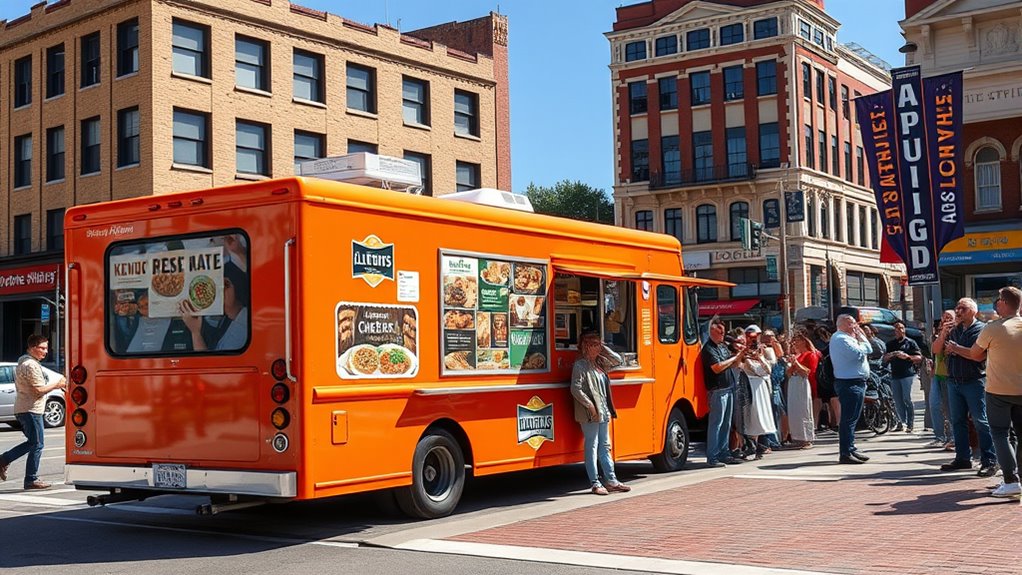To open a food truck in Springfield, Illinois, you need to secure permits from the Springfield Department of Public Works, Sangamon County Public Health, and local zoning authorities, with fees often exceeding $1,800. Choose high-traffic locations like downtown or near event venues, and keep your menu compliant with food safety standards. Prepare for costs between $30,000 and $150,000, and use marketing strategies such as social media. Continue to explore detailed steps to make your food truck a success.
Key Takeaways
- Obtain necessary permits from Springfield Department of Public Works, Sangamon County Public Health, and Springfield Building Department, including food truck and business licenses.
- Budget $30,000–$150,000 for truck purchase, equipment, permits, insurance, and initial inventory expenses.
- Focus on high foot traffic areas like downtown, event venues, and transit stops, ensuring compliance with movement regulations.
- Ensure staff complete food safety certifications and follow Illinois Food Code standards for sanitation and allergen management.
- Use social media, participate in local events, and leverage data analytics to boost marketing and attract spontaneous customers.
Navigating Permit and Licensing Requirements in Springfield
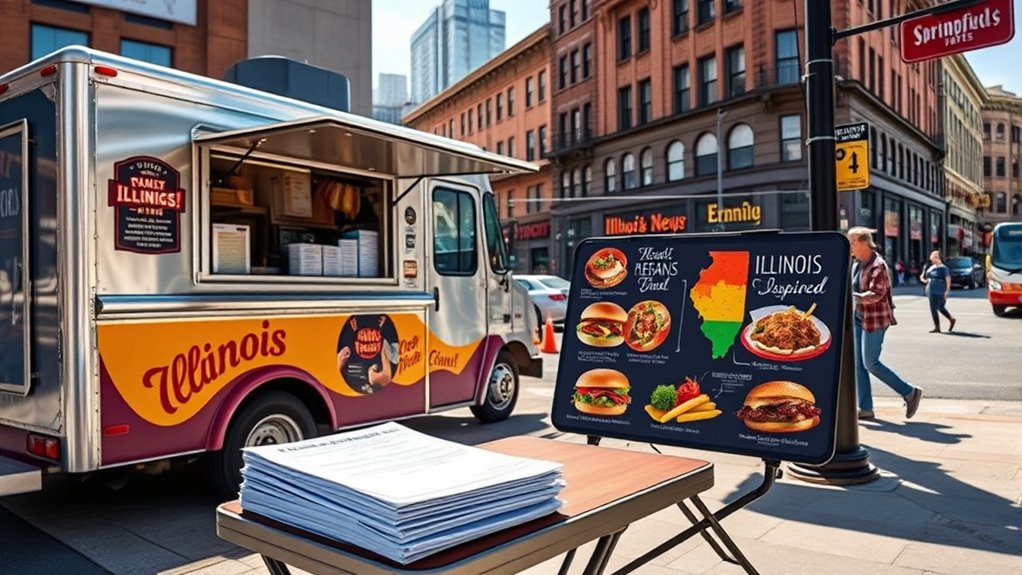
Handling permit and licensing requirements in Springfield can seem complex, but understanding the key steps makes the process manageable. First, you’ll need the appropriate licenses based on your food service type: a Mobile Food Dispenser (MFD) for pre-packaged foods or a Mobile Food Preparer (MFP) if preparing food on your truck. You’ll also require a business license specific to Springfield and Illinois. The Sangamon County Public Health Department issues a Food Truck Permit, and you may need a Fire Safety Permit, depending on your equipment and location. You must submit an application to the City of Springfield, including your vehicle details, site plans, and proof of liability insurance, with minimum coverage of $1 million. Inspections by health and fire authorities are mandatory before opening, ensuring safety and compliance. Additionally, understanding appliances labs standards can help ensure your equipment meets safety and efficiency requirements.
Estimating Costs and Managing Fees for Your Food Truck Venture
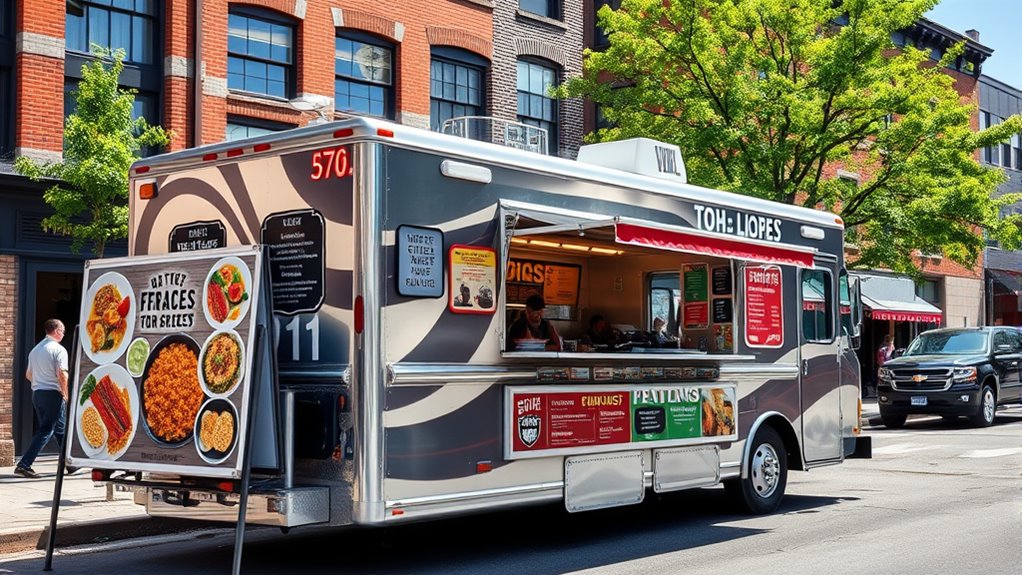
Estimating costs and managing fees are essential steps to guarantee your food truck venture stays financially viable from the start. Your initial investment can range from $30,000 to $150,000 for the truck itself, plus about $45,000 for kitchen equipment. Expect to spend $2,000–$3,000 on inventory and around $300 on serveware. Permit and license fees vary widely, averaging $1,864 but possibly exceeding $28,000 depending on local regulations. Budget for ongoing expenses like fuel, maintenance ($500–$1,000/month), staffing ($6,000/month), insurance ($1,000/year), and potential parking or location fees. Incorporate marketing costs—roughly 12–20% of revenue—and set aside funds for unexpected repairs or permit costs. Careful planning guarantees you stay within budget and avoid surprises along the way. Understanding local regulations and permit costs can help you plan more accurately and prevent unforeseen expenses.
Selecting Prime Locations for Your Mobile Food Business
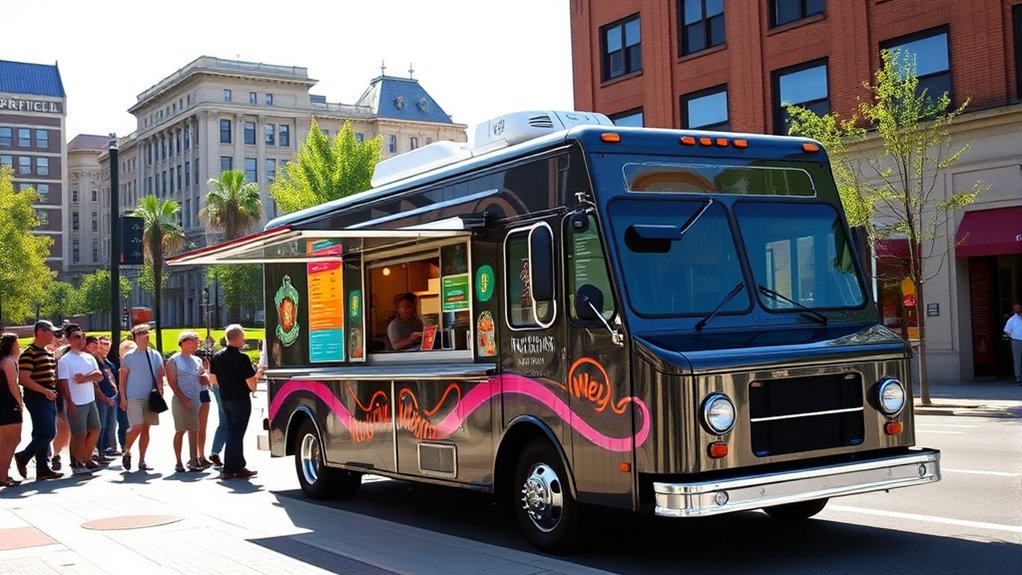
Choosing the right location is vital for your food truck’s success, so focus on high foot traffic areas like downtown Springfield, near event venues, or close to colleges. Make sure you have the necessary permits and site approvals to avoid legal issues, and consider using private property with permission to secure prime spots. The Cart Overview makes it easy to review your ideal spots and ensure all details are in place. Balancing accessibility, visibility, and regulatory compliance will help you attract customers and grow your business.
High Foot Traffic Areas
Identifying high foot traffic areas is essential for setting up a successful food truck in Springfield. Major corridors like South and North Grand Avenues see heavy vehicular and pedestrian activity, making them prime spots. During 3rd Street’s closure, Jackson Street becomes particularly busy with pedestrians, especially near streetscape improvements and events. Downtown Springfield, especially around the State Capitol and along streets 1st to 8th, attracts crowds due to government offices and tourism. The area around Central Baptist Church and local banks also sees frequent foot traffic from pedestrians attending events. Springfield’s population continues to grow, increasing the number of potential customers in these busy areas. Well-connected transit stops and pedestrian-friendly infrastructure further boost potential foot traffic for your food truck. Additionally, urban development projects can enhance foot traffic in various neighborhoods, creating new opportunities for your mobile food business.
Permitting and Site Approval
Securing the right permits and approvals is vital before setting up your food truck in Springfield, as it guarantees compliance and helps you avoid fines or shutdowns. You’ll need a Health Department Food Truck Permit from the Sangamon County Department of Public Health, and inspections are mandatory before opening. Additionally, a building permit is required, except for small carts, and must meet structural and plumbing codes. Fire safety permits depend on your equipment, and fire inspections ensure safety standards. For site approval, the Springfield Department of Public Works reviews your location, focusing on waste disposal, access, and safety. Each site requires a specific permit, and restrictions may apply regarding hours or interference with public rights-of-way.
| Permits Needed | Responsible Agency | Key Requirements |
|---|---|---|
| Health Department Permit | Sangamon County Public Health | Food safety, inspections, application fees |
| Building Permit | Springfield Building Department | Structural, plumbing, and anchorage compliance |
| Site Approval & Location Permits | Springfield Department of Public Works | Zoning, access, waste, safety considerations |
Private Property Use
Operating your food truck on private property requires obtaining prior written consent from the property owner, often notarized and including a contact for the site. This permission must be submitted with your permit application to establish legal location use. Keep in mind, private property use doesn’t override zoning laws—your site must comply with local land use regulations. To successfully select a prime location, consider:
- Ensuring the property is zoned for commercial, industrial, or office use.
- Checking proximity to high foot traffic and complementary businesses.
- Confirming vehicle access, parking, and pedestrian safety meet all safety standards.
Supporting documentation may be required to demonstrate compliance with local land use policies. Additionally, you may need formal contracts or site plans for extended operations. Always verify compliance with local ordinances and secure necessary inspections before starting. Incorporating remote work productivity strategies can help you manage your planning and licensing processes efficiently during the setup phase.
Ensuring Menu Compliance and Food Safety Standards
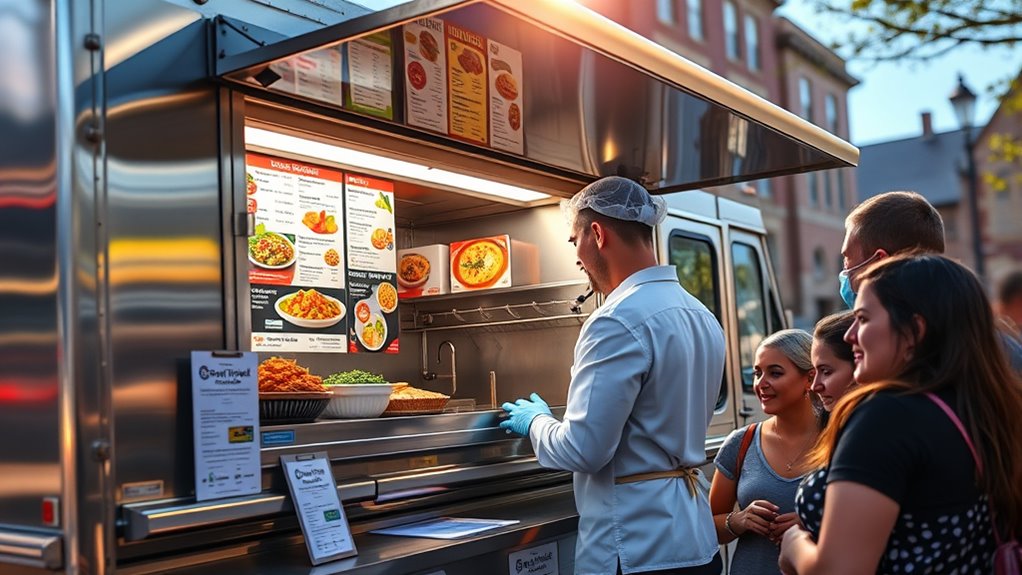
To keep your food truck compliant, you need to meet food handling certification requirements and follow strict sanitation and storage practices. Regular inspections make certain your operations stay within safety standards, preventing contamination risks. Staying informed about these processes helps you serve safe, high-quality food to your customers. Additionally, understanding the importance of food safety standards ensures that your establishment maintains the highest level of cleanliness and quality.
Food Handling Certification Requirements
In Illinois, food truck operators and their staff must complete an ANSI or IDPH-approved food handling training program to guarantee legal requirements and secure food safety. This certification ensures you and your team understand essential food safety practices to prevent contamination and foodborne illnesses. This training is vital for maintaining food safety standards and ensuring compliance with local regulations. The certification, valid for three years, is obtained after completing a recognized course and passing an exam with at least a 70-75% score. You must complete the training within 30 days of employment and renew it before expiration. Here’s what you need to know:
- Training covers handwashing, cross-contamination, temperature control, and cleaning procedures.
- Courses are available online and in-person, with materials in English and Spanish.
- Certificates are issued immediately upon passing, and records must be maintained for inspections.
- Proper training not only fulfills legal requirements but also helps reduce the risk of foodborne illnesses and protect public health through effective food safety practices.
Sanitation and Storage Practices
Maintaining proper sanitation and storage practices is essential for complying with food safety standards and protecting your customers. Store equipment and utensils to prevent contamination from dust, splash, or pests, and clean food contact surfaces regularly. Keep single-service items in a clean, dry place, using smooth, easy-to-clean shelving. Avoid storing items in locker rooms, restrooms, or under sewer lines. Food must be stored at 41°F or below or 135°F or above to prevent bacteria growth, with raw and cooked foods separated. Keep food off the floor by at least six inches, and use permitted kitchens for storage via commissary agreements. Properly install gray water tanks, and ensure regular disposal. Use a three-compartment sink for cleaning utensils, and store sanitizing cloths correctly to prevent cross-contamination. Incorporating sound vibrations and other holistic practices can also promote overall health and safety in your food truck operations.
Inspection and Compliance Processes
How do you guarantee your food truck stays compliant with food safety standards and passes inspections smoothly? First, familiarize yourself with Illinois’s adoption of the FDA Food Code 2022, ensuring your menu and operations meet all requirements. Second, schedule inspections with both city and county health departments before opening, and keep documentation up to date. Third, focus on these key areas:
- Use approved food sources and accurately reflect menu changes, including allergens.
- Follow proper cooling, storage, and hygiene practices to prevent violations.
- Maintain plumbing standards and physical conditions as per regulations.
Effective Marketing Strategies to Grow Your Food Truck Audience
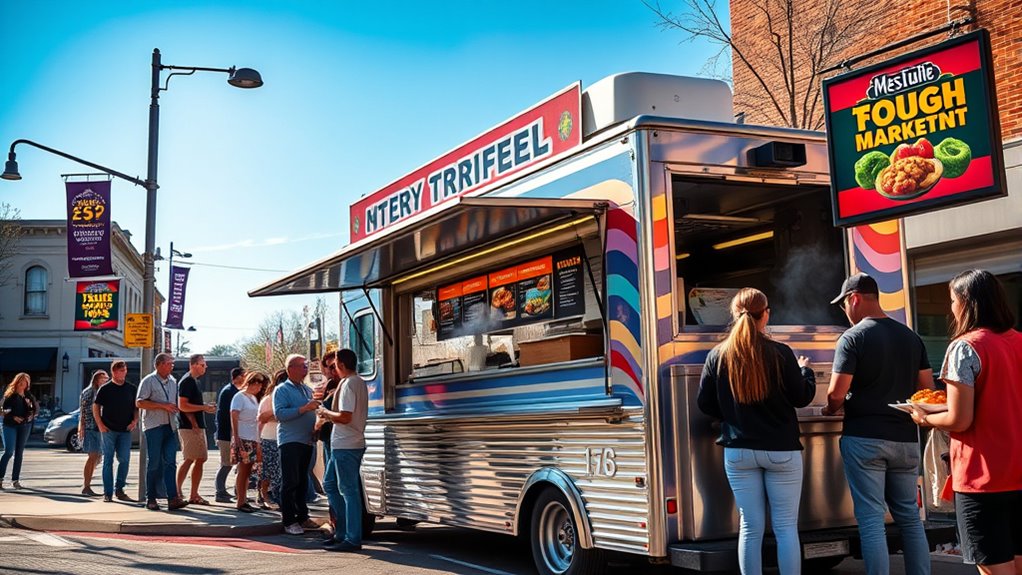
To effectively grow your food truck’s audience, leveraging multiple marketing strategies is essential. Social media is a powerful tool; 68% of food truck owners use it regularly, with Facebook being the most popular—75% of trucks are active there. Social campaigns can boost sales by 20% and encourage customers to spend 15% more. Participating in local events and festivals increases visibility, attracts diverse crowds, and fosters customer loyalty through direct interaction. Over half of food trucks implement loyalty or email programs, driving repeat visits and promoting specials. Using data analytics and GPS location services helps optimize targeting, identify peak times, and attract spontaneous customers. Tailoring your marketing efforts to Millennials and Gen Z ensures you connect with the core audience seeking variety, experience, and social engagement. Additionally, incorporating seasonal and holiday-themed promotions can lead to a 25% increase in customer visits, making your marketing efforts even more effective.
Implementing targeted marketing strategies based on customer preferences and behaviors can further enhance engagement and growth.
Additional Regulations and Operational Tips for Success
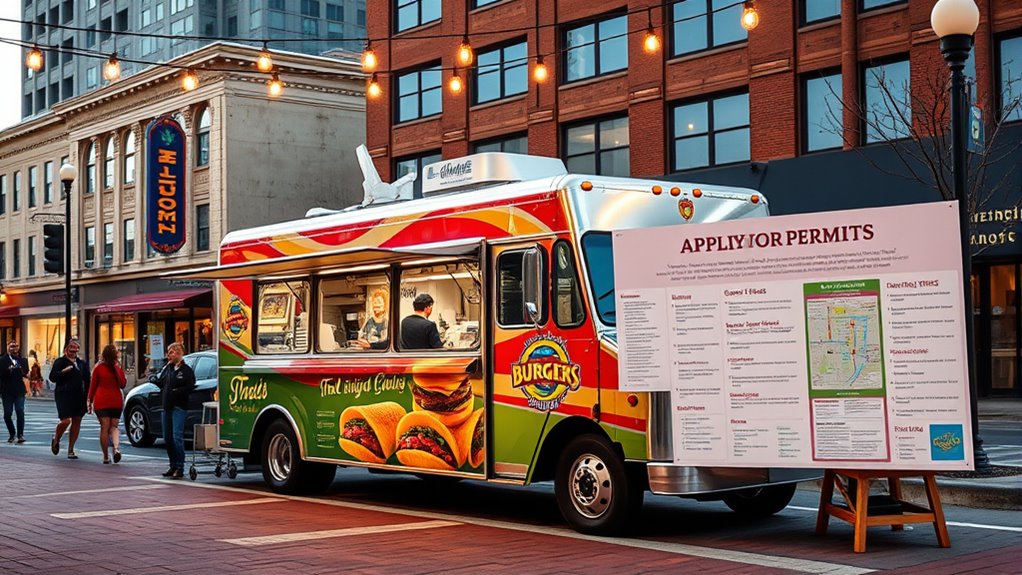
Navigating Springfield’s food truck regulations requires careful attention to compliance and safety standards that protect both your business and customers. To succeed, follow these key tips:
- Ensure all permits—health, building, parking, and fire safety—are current before opening. Fees range from $250 to over $1,000, so budget accordingly.
- Stay mobile by moving your truck every two weeks, as local rules prohibit long-term stays in one spot.
- Maintain strict safety standards: conduct regular inspections, keep detailed records, and adhere to Illinois and city codes for plumbing, structural integrity, and noise regulations. A higher contrast ratio can improve the clarity of signage and menus, making your truck more attractive to customers.
- Regularly review local ordinances to stay updated on any changes that could affect your operations. Following these guidelines helps prevent fines, shutdowns, and neighborhood complaints, keeping your operation smooth and compliant.
Frequently Asked Questions
How Long Does the Permit Approval Process Typically Take in Springfield?
You’re probably wondering how long the permit approval process takes. Typically, once you submit your complete application with all supporting plans, the Springfield Health Department reviews it within two weeks. After that, inspections are scheduled, which can add about 10 days. Overall, you should expect a process of roughly 3 to 4 weeks, but delays can happen due to inspections or external factors like holidays or construction.
Are There Specific Restrictions on Operating Hours for Food Trucks?
When it comes to operating hours, you need to play by the rules to stay out of hot water. In Springfield, Illinois, food trucks can run from 6 a.m. to 8 p.m., with ice cream trucks having shorter hours. You also can’t stay put in one spot for too long or operate too close to other eateries. Following these guidelines guarantees your business runs smoothly without a hitch.
Can I Sell Alcohol From My Springfield Food Truck?
You can’t sell alcohol from your Springfield food truck unless you obtain a valid liquor license from the City of Springfield’s Office of Business Licensing. You’ll need to apply for a specialized license, like a Class E, and get approval before selling beer or wine. Keep in mind, licensing involves fees and in-person applications, and selling alcohol without proper authorization can lead to fines or closure.
What Are the Insurance Requirements Beyond Liability Coverage?
You’ve asked about insurance requirements beyond liability coverage. You’ll need commercial auto insurance to cover accidents and damages while driving, including physical damage to your truck and equipment. Consider adding inland marine insurance for tools and inventory, trailer endorsements for detached trailers, and cargo insurance for goods in transit. If you handle customer data or digital payments, cyber liability is smart. Workers’ comp may be necessary if you employ staff, ensuring extensive protection.
Is There a Recommended Minimum Budget for Starting a Food Truck in Springfield?
You’re wondering about the minimum budget needed to start a food truck. Based on typical costs, you should plan for at least $50,000 to $100,000. This covers vehicle purchase or retrofit, permits, initial inventory, equipment, and marketing. Keep in mind, costs vary depending on truck condition, local fees, and your menu. Proper planning guarantees you have enough funds to launch smoothly and sustain operations.
Conclusion
Starting your food truck in Springfield is a journey that requires careful planning and attention to detail. By steering permits, managing costs, choosing the right spots, and marketing effectively, you set yourself up for success. Think of it as planting seeds—you’ll need patience and persistence to see your business flourish. Stay flexible, adapt to regulations, and keep your eyes on the prize, because with dedication, you’ll turn your food truck dreams into a thriving reality.
